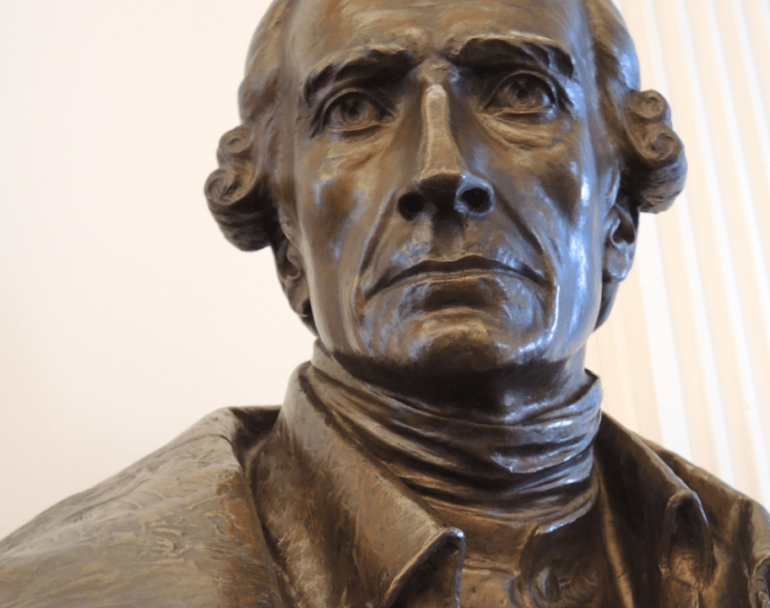
Today in History: Patrick Henry Born
By: Dave Benner
Today in History, on May 29 1736, Patrick Henry was born. Known as “Hot Head” and “The Voice of the Revolution,” Henry was a renowned Virginian whose talents as a lawyer and politician were matchless. Henry had an uncanny penchant for fiery oratory, using his skills to persuade Virginians to adopt the patriot cause.
During the Stamp Act Crisis, he proposed a set of resolutions that would effectively undermine the controversial policy’s legitimacy and nullify enforcement of the act within the state. While Henry produced a valid argument that the Stamp Act was contrary to the constitutional boundaries of the British system, some considered his resolutions seditious. When accused of treason, Patrick Henry stated: “Caesar had his Brutus, Charles the First his Cromwell, and George the Third…may he profit by their example.”
As tensions between the American colonies and the crown came to a boiling point, Henry was pivotal in the colony’s transition to republicanism when a schism emerged between Henry and Virginia’s Royal Governor, Lord Dunmore, after the latter dissolved the colony’s legislature. Playing a leading role in the Virginia Conventions of 1774-1776, Henry worked to undermine royal authority by organizing boycotts of British goods, preparing companies of militia to begin mustering in preparation for potential conflict, and challenging the Tory doctrine of Parliamentary Sovereignty – which declared that British Parliament could bind the colonies “in all ways whatsoever.”
As a delegate to the Continental Congress, Henry emerged as a radical voice that vied with conservatives like Joseph Galloway and John Dickinson – both of which sought a peaceful reconciliation with Britain. Henry’s deeds were also instrumental in convincing the Old Dominion to adopt a course of independence and commit its militia to the cause. The culmination of this decision came after an infamous speech in St. John’s Church on March 20, 1775. There, the ardent Henry implored the delegates to engage Britain directly. “There is no retreat but in submission and slavery,” he warned:
“Our chains are forged! Their clanking may be heard on the plains of Boston! The war is inevitable and let it come! I repeat it, sir, let it come…It is in vain, sir, to extenuate the matter. Gentlemen may cry, Peace, Peace but there is no peace. The war is actually begun! The next gale that sweeps from the north will bring to our ears the clash of resounding arms! Our brethren are already in the field! Why stand we here idle? What is it that gentlemen wish? What would they have? Is life so dear, or peace so sweet, as to be purchased at the price of chains and slavery? Forbid it, Almighty God! I know not what course others may take; but as for me, give me liberty or give me death!”
By all accounts, the event was a watershed moment for Virginia. Several men that would rise to great prominence in the young republic were in attendance, including George Washington, Thomas Jefferson, and St. George Tucker. Regardless of their political allegiances, all were profoundly captivated.
According to Edmund Randolph, the convention sat in silent consideration of Henry’s words for several minutes. Much of the Virginia General Assembly was stunned by the provocative nature of Henry’s comments, and Henry was even accused of treason by some. Despite these objections, the resolutions Henry offered passed by the narrowest of margins, with popular figures such as George Washington and Richard Henry Lee voting in favor. On the dawn of independence, Virginia joined the military cause against the British.
By 1776, after Lord Dunmore had been ejected from the colony for fear of his life, the Virginia Convention dissolved all political ties with Great Britain. The fiery Henry generally aligned with George Mason, the primary author of the Commonwealth’s new Declaration of Rights and republican constitution. In May of 1776, Henry was elected the state’s first republican governor by the Virginia House of Delegates.
Henry was undoubtedly the strongest political force of his time in Virginia, and one of the most famous figures of the era. He found such success in opposing the political aims of Thomas Jefferson and James Madison in the 1780s that the former once remarked the only political hope was to pray for Henry’s death. While not everyone agreed with all of Henry’s political views, they certainly realized his influence and popularity.
Henry was also known for his strong opposition to the United States Constitution. When called as a delegate to the Philadelphia Convention, Henry’s response was to decline, believing he “smelled a rat.” Henry was convinced that a subset of delegates would attempt to impose a nationalistic government and usurp the powers of Virginia, and prognosticated that the convention would “oppress and ruin the people.” Henry attacked the possibility of a direct taxation power, congressional control over state militia, and the creation of an executive office. Along George Mason, he was a strong proponent of a bill of rights, considering its inclusion as a necessity should the Constitution be considered.
While he did not particularly like Patrick Henry, Jefferson later wrote in reflection of his oratory: “It is not now easy to say what we should have done without Patrick Henry. He was before us all in maintaining the spirit of the Revolution.”